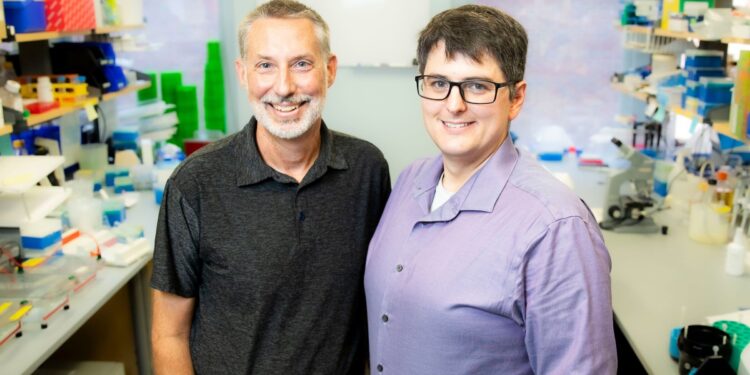Jeffrey Rathmell, Ph.D., left, and Andrew Patterson, Ph.D., have discovered a new set of metabolic genes that are important for immune cell function. Credit: Vanderbilt University Medical Center
Inherited diseases of metabolism and immunity have more in common than previously thought, according to a new study published in the journal Sciences ImmunologyThese results highlight a new set of metabolic genes important for immune T cell function and offer insights that could improve the care of patients with these disorders.
The study looked at genes responsible for inborn errors of metabolism (disorders of the processes cells use to convert food into energy) and inborn errors of immunity (disorders affecting how the immune system works). These rare and complex diseases are not fully understood.
“There were previously only a small number of genes on both disease lists, but we found that many more overlapped,” said Andrew Patterson, Ph.D., who led the study as a postdoctoral researcher working with Jeffrey Rathmell, Ph.D., at Vanderbilt University Medical Center. “Our study showed that many of the genes associated with inborn errors of metabolism can also potentially affect T cell function when mutated.”
The findings suggest that patients with inborn errors of metabolism may also have immune defects that could impact their care, and conversely that metabolic defects may contribute to symptoms in patients with inborn errors of immunity.
“There is still much to learn, but these connections could lead to different therapies,” said Rathmell, the Cornelius Vanderbilt Professor of Immunobiology and director of the Vanderbilt Center for Immunobiology. “Rather than categorizing them, these diseases are part of a continuum; there is a gray area between them and a potential new class of inborn errors of immunometabolism that intersects them.”
Patterson and his research team used a CRISPR gene-editing approach to screen for inborn errors in metabolism genes to detect immune defects and for inborn errors in immunity genes to detect metabolic defects. They then analyzed one example from each set (one metabolic gene with an immune defect and one immunity gene with a metabolic defect) to more closely examine the mechanistic impact.
Overall, Rathmell’s team is interested in uncovering how metabolic pathways regulate T cell function, with the goal of developing targeted therapies for immune-mediated disorders.
“We’ve laid the groundwork for further research,” Patterson said. “The two examples we studied in detail point to new biology and mechanisms, and we’ve identified hundreds of other genes to analyze their role in T-cell function.”
The results are available on a website and can be used by other researchers.
“If you’re trying to understand the links between metabolism and immunity, this is a great place to start,” Rathmell said.
Patterson recently joined the University of Louisville faculty as an assistant professor of biochemistry and molecular genetics. Vanderbilt collaborators Vivian Gama, Ph.D., associate professor of cell and developmental biology, and Janet Markle, Ph.D., assistant professor of pathology, microbiology and immunology, made significant contributions to the study.
More information:
Andrew R. Patterson et al., Functional overlap of inborn errors of immunity and metabolism genes defines metabolic vulnerabilities of T cells, Sciences Immunology (2024). DOI: 10.1126/sciimmunol.adh0368
Provided by Vanderbilt University Medical Center
Quote:Rare diseases highlight links between metabolism and immunity (2024, August 17) retrieved August 17, 2024 from
This document is subject to copyright. Apart from any fair dealing for the purpose of private study or research, no part may be reproduced without written permission. The content is provided for informational purposes only.



